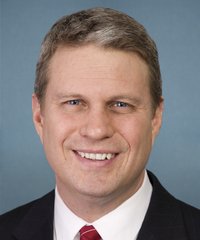
Congressman Bill Huizenga (HIGH-zen-guh) represents Michigan's 2nd Congressional District which stretches from Kentwood to the lakeshore and up the coast of Lake Michigan from Holland to Ludington. Huizenga was first elected to Congress in 2010 and is currently serving in his sixth term.
As a member of the prestigious House Financial Services Committee, Huizenga has focused on removing government-imposed barriers to private sector job creation and increasing transparency across the federal government. Because of his steadfast leadership, Congressman Huizenga has been selected to serve as Ranking Member on the Investor Protection, Entrepreneurship, and Capital Markets Subcommittee for the 117th Congress.
Federal Prison Industries (FPI), also known as UNICOR, is a government-owned corporation that employs federal prisoners to manufacture products and perform services to fulfill contracts that are sold to executive agencies and departments across the federal government. Examples of these products and services include: military equipment, clothing and textiles, office furniture, electronics, fleet and industrial products, recycling services, call centers, and help desk support. Federal Prison Industries operates 83 factories in federal prisons across the country with sales totaling approximately $472 million in the last year alone.
Under the current system, if FPI wants a contract from the federal government, it gets it. More often than not FPI is given a contract, not because other companies do not produce the product or service requested, but because it receives preferential treatment when it provides services to the federal government. This process takes jobs away from hardworking men and women that are currently employed by the private sector, has a negative impact on economic growth, and does not guarantee the highest quality product or best use of taxpayer dollars.
To remedy this, in March of 2015, Congressman Huizenga introduced H.R. 1699, a comprehensive and bipartisan approach to reforming FPI known as the Federal Prison Industries Competition in Contracting Act. This legislation eliminates FPI's no-bid contract status, allowing small businesses to compete with this government-owned goliath. With millions of Americans out of work and small businesses manufacturing still struggling to keep the lights on in many areas across the country, it makes no sense for the federal government to be using prison labor to limit our nation's job creators from bidding on contracts. This bill ensures the federal government's priority is to preserve market access for small businesses and create jobs for hardworking men and women. Additionally, H.R. 1699 requires FPI to submit a detailed analysis of the impact to the private sector before entering into new product markets and would prevent FPI from selling products commercially or internationally where the only customer could be the federal government.
In March of 2016, Congressman Huizenga introduced a more targeted approach to reforming FPI called The Small Business Protection Act of 2016. Specifically, this legislation addresses four key issues:
In August of 2016, it was widely reported that FPI endangered the lives of U.S. troops by manufacturing defective military helmets. In all, 126,000 helmets were recalled, costing taxpayers over $19 million dollars. This recall demonstrates the danger FPI poses. Making matters worse, a Department of Justice Inspector General report found that FPI employees instructed inmates to make unsafe modifications to the helmets and falsify documents showing the faulty helmets met the required safety specifications. To read more about these findings click here.